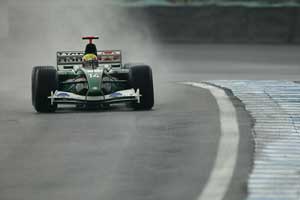DECEMBER 21, 2003
Review of the Year: 7th - Jaguar Racing

Jaguar Racing has been a political minefield since its inception but this year there were finally signs that someone within the Ford Motor Company is taking the operation in hand and doing the right things. For much of 2002 Ford executive Richard Parry-Jones did an in-depth analysis on what was wrong with Jaguar Racing and concluded that a new management was needed and that the team needed to be freed of all the different political influences which had blighted its progress in previous seasons. He swung the axe and put Tony Purnell of PI Research into the role of being head of Jaguar Racing, Cosworth Racing and PI. David Pitchforth emerged from the shadows to run the team itself, although he had been integrally involved in the development of the R4 chassis right through 2002. There were cuts in the number of people involved and a few new appointments to streamline and improve the team. The first two races of the year did little to show the true potential of the R4 but for those who cared to look there were signs that this was quite a quick little machine. In Interlagos Mark Webber rammed the point home when he qualified fastest in the wet qualifying session on Friday and then narrowly missed taking pole position on Saturday. In the race the car was more difficult but Webber was in the hunt for a podium finish until his tires wore down so much that he lost control of the car and had a huge accident. The performance was all the more impressive because in those early races the team was suffering from a serious fuel pick-up problem which meant that Webber had to race with bigger fuel loads than his opposition. Even after this was solved Webber found the car to be much better in qualifying than it was in the race with the tires being the major problem. The Jaguar could not hack it with the big boys, except in a place like Hungary where overtaking is so difficult. Mark helped Fernando Alonso enormously in Budapest by holding everyone up and allowing the Renault driver to get away and so win his first Grand Prix victory. In the light of this pace Webber's total of 17 points (and 10th place in the Drivers' title) seems rather a skimpy total but reliability was an issue early on for Webber and most of the time for the second car. The second car was really the point of most contention in 2003. Antonio Pizzonia seemed to be on the way out even before he was properly in the team, with some fairly nasty pushing and shoving going on around the time of the Spanish GP. This was not the way to help a young driver deliver the goods. When finally the knife slashed the summer, Justin Wilson came in and did little better than Pizzonia had done, although he did pick eventually pick up one point. Up until Wilson's troubles F1 observers were willing to say that Pizzonia had been to blame but the fact that two men who had proved their worth in other formulae but were both unable to do anything at Jaguar Racing proved too much for most to accept. They argued that either Webber was a genius or Jaguar could not prepare two cars properly. The suggestion that this may be the case upsets the team considerably but there is plenty of evidence to back up the theory. When Pizzonia got back into a Williams towards the end of the year he was quick again... One of Jaguar's major problems (or "issues" as they team liked to call them) was that there was not enough money to do all the work needed. The team had restricted testing and so when parts did arrive there were often only enough for one car. That is normal and it is logical that these go to the number one driver. Trying to pretend otherwise is not a good idea because it only leads to friction. There was still a certain amount of friction within the team, highlighted by the fact that John Hogan came and went as sporting director in the space of one season. If anyone in F1 knows what it takes to be successful in F1 it is Hogan so Jaguar Racing should ask some serious questions about why he is gone. Nonetheless it was a promising season for Jaguar and if the team can build on the foundations laid in 2003, it should be in a position to be a serious challenger for fourth or fifth in the Constructors' title in 2004. The team now has access to two proper windtunnels and has a lot of good people so the world is now waiting for results. And so are the people in Detroit...